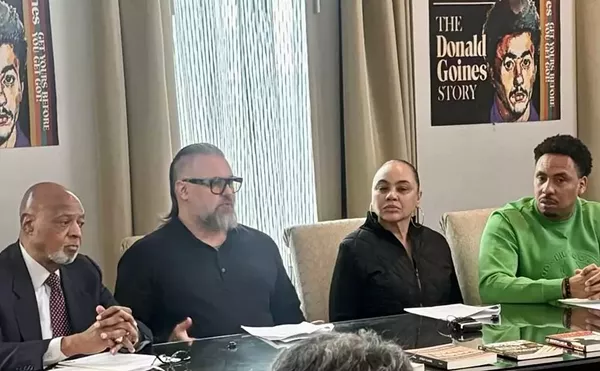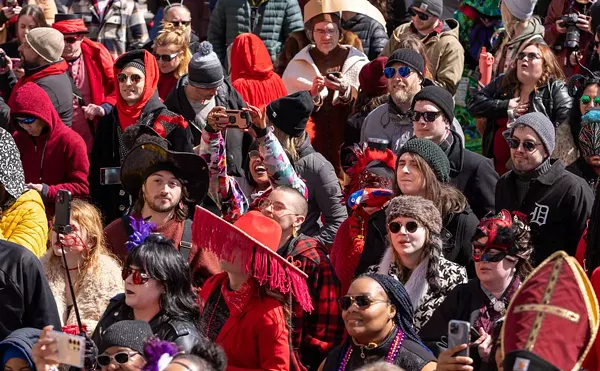Photojournalist Candace Barbot was looking for a subject for his first full-length documentary when a story in Rolling Stone jumped out at her. Her mother had recently passed away and Barbot says she was silently asking her mother to help her find the right topic.
"I was really frustrated having not found a story," she says. She'd started working on a documentary about homeless female veterans, but lost touch with her subjects when her mother died.
But as she sat down to read that Rolling Stone article, everything just clicked.
"The story leapt off the page to me. I knew this group was really unique." The group was the Detroit Dog Rescue.
"I knew I could tell the story about Americans facing troubles economically through the metaphor of these dogs," says Barbot. "The dogs are a metaphor for many things."
Barbot, who is originally from Florida, quickly touched base with Daniel "Hush" Carlisle, the local rapper who heads up the nonprofit. He and his PR guy, David Rudolph, greenlighted the project and Barbot got to work.
Much of the documentary was shot during the winter of 2012-2013. She shot the film almost entirely by herself with no production crew. Other than about 12 days of shooting when one other filmmaker assisted her, she made and produced the entire documentary herself.
"It was a heroic effort," says Barbot. "I mortgaged my house, which was paid off, to fund the film. It's been a hell of a journey. I've grown tremendously as a person having been exposed to Detroit."
Barbot says part of the reason she was able to make the film was because of the welcoming folks who run and work at the Detroit Dog Rescue.
"I got really lucky as a first time filmmaker to really have a group of people who opened their arms to me and laid themselves pretty bare," she says. "One thing I can say about the crew at DDR is that they are anything but your typical people. They are highly inspired, completely passionate, driven, unique, and idiosyncratic. You have all these different personalities. What happened in the making of this film is that it became a loving portrait of an organization that moves entirely from their heart."
The film focuses on seven characters within the organization. She shot the documentary in cinema verite, or direct cinema, style, meaning there are no voiceovers or interviews. Instead, the entire story is told through the scenes she shot with the nonprofit in the field.
"It's an approach that isn't popular because it's hard to do. You're not relying on voice over. You're not relying on any interviews. You allow every scene to tell the story and the filmmaker doesn't touch it. The action tells the story and moves the story forward. This is 100 percent direct cinema, which is pretty remarkable," she says.
While Detroit's stray dog problem is a big, well, problem, Barbot says the documentary is more entertaining than one might expect.
"You think it's going to be that 'Sarah Mclachlan sad dogs dying,' but because of the humor of the people, the whole thing is a ride. One scene after another is just one big ride through Detroit," she says. "It wasn't meant to be a heavy-handed social issue-driven thing, which I did think about doing. I had to do it from my own heart. I've always been inspired by the better parts of ourselves and our humanity. It turned into this loving portrait and they’re wonderful people."
Barbot says she withheld a lot of the graphic imagery she filmed. She felt it was important to not completely horrify the audience. That's not the point of the story she's telling.
"There were so many things that I could not put in the movie," she says. "How many do you need to see? It's graphic. You don't want to go down that road where you're making a whole different film."
Barbot shot the film only during the cold months in order to better show the issues both Detroit Dog Rescue and the city's stray dogs face.
"I chose the winter because they said if I really wanted to see the urgency of the situation that I should come in the winter because thats when it's critical," she says. "Every day, every hour counts if a dog is out there in a critical situation."
Barbot currently lives in New York, but is in town for the world premiere of the documentary, which happens this Sunday at the Freep Film Festival. She says having the premiere here in Detroit has made the whole process come full circle.
As for her future in Detroit, Barbot says she'd love to make another documentary here, if she can find the right story.
Detroit Dog City plays at the Detroit Film Theater at 1 p.m on Sunday, March 22. Click here for tickets.

Audio By Carbonatix
[
{
"name": "GPT - Leaderboard - Inline - Content",
"component": "35519556",
"insertPoint": "5th",
"startingPoint": "3",
"requiredCountToDisplay": "3",
"maxInsertions": 100,
"adList": [
{
"adPreset": "LeaderboardInline"
}
]
}
]





